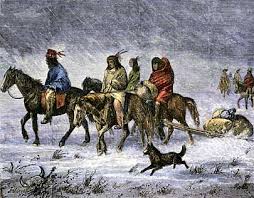Enter to win a copy of the award winning book
Sam Sixkiller: Cherokee Frontier Lawman

A springboard wagon topped a ridge surrounded by a grove of ancient juniper trees seven miles outside Muskogee. The wagon was weighted down with several heavy crates and made little sound. The contents inside the crates slouched as the vehicle slogged through the rain-soaked turf. The soft ground muffled the hardworking wheels and the horse’s hooves. Solomon Coppell, an unshaved man dressed in a dirty, fawn-tan suit with a long-tailed coat, drove the wagon over a crude trail cut deep in mud and dirt. His roving button eyes scanned the scene in front of him, looking for anything out of the ordinary.
Just beyond Solomon’s line of sight, tucked behind a thicket of brush, Captain Sam Sixkiller sat on his horse watching him.1 Sweat rolled down the lawman’s face as the sun in late spring of 1883, riding up into a leaden sky, empty and cloudless, and touched the captain with a sticky heat. Solomon was uncomfortable too. He pulled off the flat-brimmed $50 hat on his head and backhanded a bead of perspiration off his hairline. He then put his hat back on as he continued along his way. The captain waited for just the right moment and then in one fast, flawless movement spurred his horse onto the trail directly in front of Solomon’s team.
A stunned Solomon quickly jerked back on the reins of the animals and brought the skittish horses to a stop. “Hold it, Coppell!” Captain Sixkiller announced in a sober, stern voice. “You’re under arrest.” Solomon glanced at the cargo he was hauling and back to the captain. The lawman was alone and the bootlegger was confident he could survive a confrontation with his wagon load intact. Solomon stared at the captain for a moment shaking his head. “I got a tip you were bringing booze into the Nation,” the captain informed him. Solomon didn’t reply and showed no signs of cooperating “Surrender, Coppell,” Captain Sixkiller warned him again. “Throw your guns out in the road.” The captain was empty-handed, his leg gun still resting in a holster on his thigh. Coppell made a grab for the shotgun on the wagon seat.2 The captain’s hand whipped forward in a short, small arc. There was no strain. He saw Coppell’s face, distorted and desperate. His gun kicked back against his wrist. One shot. He saw Coppell’s body jerk. Captain Sixkiller’s gun exploded before it cleared his coat. He saw the flame of the shot lick through the fabric and curl to form a smoldering ring. Coppell swayed and fell into the trace chains and wagon tongue. The team reared and snorted and pawed at the air. The captain calmed the horses and kept them from running away.3
Most Muskogee residences agreed that Captain Sixkiller was an effective policeman, quick to enforce the laws regarding the buying and selling of alcohol. Some thought the rules should be relaxed. Cherokee Indian business owners believed they should have the right to purchase liquor to be sold to white railroad workers and settlers passing through. Indian leaders maintained such measures would lead to an increase in violence on the Nation and insisted that troublemakers who peddled whiskey were to be stopped.4
Although Captain Sixkiller was never accused of being too harsh on those who violated the law, there were Indians like former chief of the Cherokee Nation, Lewis Downing and Indian agents like John B. Jones who thought that the United States marshal and his deputies went too far in upholding the law. “Some deputy marshals make forcible arrests,” Chief Downing told Indian agent Jones in a letter, “without regard to circumstances or the facts of the case, and without any of the forms of law.”5 Smugglers occasionally planted whiskey on innocent people making their way across the Nation. If they were stopped by Captain Sixkiller or his deputies and alcohol was found in their possession they were arrested and taken immediately to Fort Smith, Arkansas, to be prosecuted. Chief Downing strenuously objected to the captain’s rush to judgment and believed in those instances such individuals should be given the benefit of the doubt.6
To learn more about the life and times of Sam Sixkiller read
Sam Sixkiller: Cherokee Frontier Lawman

